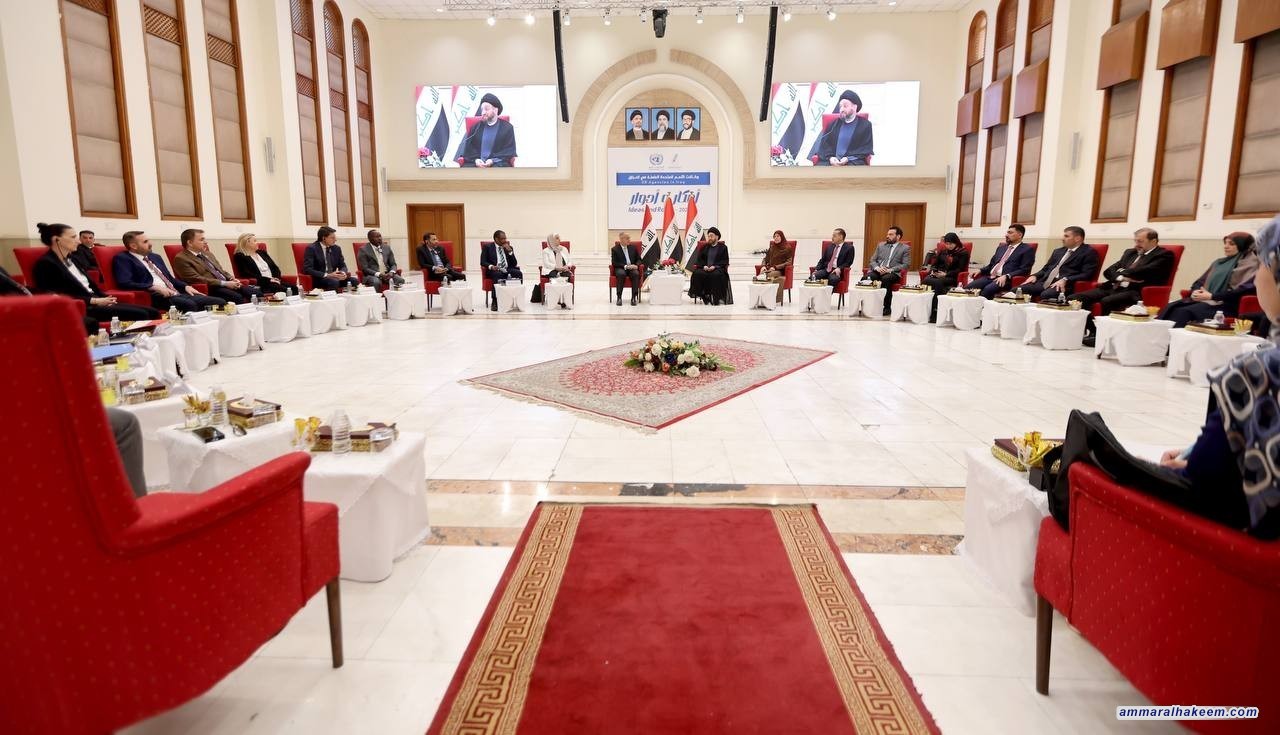Sayyid Al-Hakeem suggests a joint fund between the government and UN agencies to sustain aid for marked transitional period
In his meeting with United Nations agencies operating in Iraq on 19/10/2023, Sayyid Ammar Al-Hakeem praised the roles of these agencies and the aid they provide, especially since this meeting coincides with International Days of humanitarian and relief themes. H.E. proposed a joint fund for financing between United Nations agencies and the Iraqi government to sustain the support process during an agreed transitional period. H.E. expressed his regret for the international community's continued silence on what is happening in Palestine. H.E. emphasized that humanity cannot be divided; there is no human and another. H.E. also pointed out that targeting hospitals is a condemned and denounced act in all conflicts.
His Eminence referred to Iraq's centrality stemming from its history, civilization, roles, and geographic location among the major regional players. H.E. stressed that Iraq has undergone significant transformations from the era of dictatorship to its fall and the establishment of a democratic system. H.E. explained that the Iraqi democratic experience suffered from misunderstandings, making it a subject of debate within the Arab and Islamic realms, marked by demonization and distortion of facts, enlarging negativities, and turning the blind side towards the positives, including the peaceful transfer of power.
Sayyid Al-Hakeem pointed to the nature of terrorism targeting Iraq, its alignment with agendas facilitated, funded, trained, and politically and media-wise covered. H.E. stressed that the Iraqi experience has produced a different fate for its leaders. In the past, Iraqi leaders either faced death, imprisonment, exile, or remained in power. Today, the president transfers his mandate to his successor normally and then returns to political life. H.E. also noted Iraq's areas of strength that far surpass its weaknesses and delays.
H.E. highlighted the nature of Iraqi society and the proportion of advanced youth within it. H.E. emphasized that Al-Hikma National Movement is meant to represent their concerns and aspirations, as they have assumed high positions in the movement at the level of the political bureau and other institutions. H.E. also discussed the experience of the Al-Hakeem Foundation and the services and educational opportunities it provides through schools and available institutes.
Sayyid Al-Hakeem also pointed out the challenges Iraq faces, such as climate change, noting that Iraq is experiencing significant climate changes that may make it one of the most affected countries. H.E. praised the government's direction in this regard to mitigate its impact. H.E. also mentioned the challenge of water scarcity for drinking and the broadening migration from rural to urban areas, emphasizing the importance of helping Iraq regain its agricultural, industrial, and tourism status and encouraging investment.
H.E. affirmed that the government's program is ambitious and promising. There are pathways for implementation and monitoring of the execution level through the relevant committees, which is a new phenomenon not present in previous years. H.E. also stressed the importance of administrative reform. H.E. called on international organizations to assist in building institutions and training and qualifying administrative staff. H.E. urged organizations to clarify their achievements, work scope, and fairness in tasks and project distribution, emphasizing the necessity of supporting organizations with actual achievements.
H.E. also stressed the importance of combating corruption, stating that discussing corruption is a more significant issue than corruption itself. H.E. emphasized that reforming the banking system is an essential condition for achieving development. H.E. warned against drugs, calling for their treatment and addressing them as a more dangerous challenge than terrorism. H.E. pointed to the necessity of continuing to counter extremist ideologies, addressing the issue of displaced people, and completing the necessary legislation for the political system. H.E. called for assistance in adopting similar experiences in federal systems regarding wealth, its distribution, and management. H.E. also emphasized the importance of resolving border disputes with neighboring countries through dialogue and adhering to the principle of good neighborliness.
H.E. proposed the establishment of a joint fund between United Nations agencies and the Iraqi government to manage the financing file during an agreed transitional period, warning against abruptly cutting off support to Iraq. H.E. stressed the need for support to be devoted to the development of institutions and empowering them to keep up with administrative and technological developments. H.E. highlighted the necessity of synergy between United Nations agencies and the Iraqi government to serve the Iraqi people.


/9/3/photo_2025-12-10_09-25-13.jpg)
/9/2/photo_2025-12-10_09-17-58.jpg)
/9/1/photo_2025-12-10_09-11-13.jpg)
/8/3/photo_2025-12-09_10-42-49.jpg)
/8/2/photo_2025-12-09_10-37-31.jpg)
/8/1/photo_2025-12-09_09-54-18.jpg)
/7/1/photo_2025-12-08_09-38-41.jpg)
/5/1/photo_2025-12-07_09-25-35.jpg)
/3/2/photo_2025-12-04_11-05-55.jpg)
/3/1/photo_2025-12-03_11-49-28.jpg)